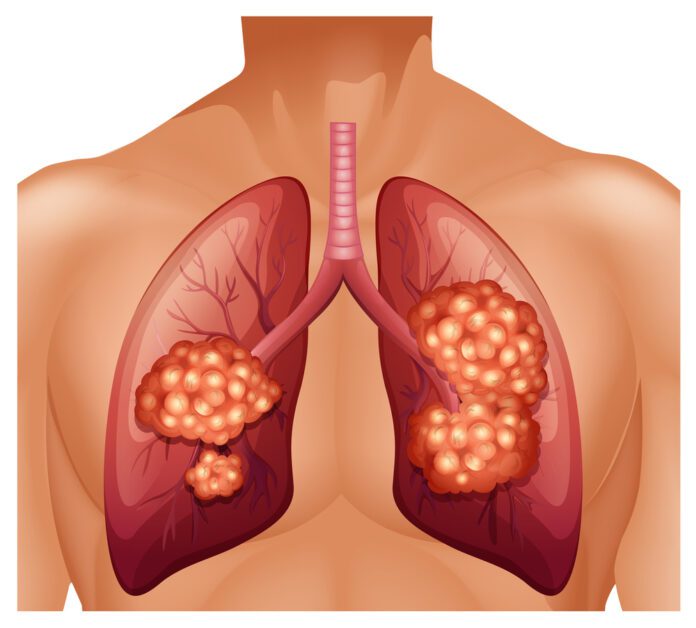Overview
ALK (Anaplastic Lymphoma Kinase)-positive lung cancer falls under the broader categories of non-small cell lung cancer (NSCLC), adenocarcinoma group. Adenocarcinoma (‘adeno’ latin for gland) means that the cancer starts in the glands that line the inside of one of your organs. The ALK gene tells your body how to make proteins that help cells talk to each other; those proteins are particularly prevalent in the lungs.
ALK-positive lung cancer starts in the lungs, likely as a single solid tumor, but it can spread to other parts of the body. Untreated, ALK-positive is likely to spread quickly to other lung lobes, the other lung, and to the brain. Because of the quick spread to the brain, medications that reach the brain are of utmost importance.
ALK-positive is not hereditary (passed down through families).
Cause
A number of both genetic and environmental (asbestos, smoking, radon) factors are known to cause lung cancer, although the precise mechanism is not clear. Patients with non-small cell lung cancers that harbor the ALK fusion oncogene are more likely to have never smoked or to be a light smoker than the average patient with lung cancer. In one study database of 255 patients with ALK rearrangements, never smokers and former smokers comprised 70% and 28% of cases, respectively. ALK rearrangements are found in about 3%-7% of lung cancers and tend to occur in younger individuals.
Symptoms
Lung cancer may not show symptoms until you’ve had it long enough for it to spread to other parts of your body. It is harder to treat as it progresses, so do not delay checking in with a doctor.
If you suspect that you have any symptoms of lung cancer, like those below, see your doctor immediately:
• Coughing up blood
• Shortness of breath
• A weak or tired feeling
• Wheezing
• A cough that doesn’t go away
• Chest pain that gets worse with deep breathing, coughing, or laughing
• Hoarseness
• Weight loss without trying or loss of appetite
Many doctors, from general practitioners to specialists, are not aware of ALK-positive lung cancer and other oncogene cancers. These medical professionals may not realize that a younger patient or non-smoker could have cancer. You may have to have a discussion with your doctor about ALK-positive in order to get the tests you need.
Treatment
Therapy is used in treating stage IV on cancer with ALK rearrangement. Drugs such as crizotinib (Xalkori), ceritinib (Zykadia), and alectinib (Alecensa) have been developed to target the activity (lung cancer cell growth) of the abnormal fusion protein. Interference with the abnormal fusion protein does not allow cancer cells to divide and multiply very well; this treatment may prolong a patient’s life span. The targeted therapy can be used in conjunction with other treatments, depending upon your physician’s treatment protocols.
Other
ALK is currently diagnosed by genetic testing, known as molecular testing, of a sample. Most doctors use a test called FISH (fluorescence in situ hybridization). In the United States, FISH, IHC, and NGS are approved companion diagnostic tests to identify ALK-positive NSCLC. In Europe, IHC is widely used to detect ALK.
To obtain a sample, it is necessary to undergo a biopsy, typically through a needle biopsy or a small surgical procedure. We recommend going to an expert for this procedure, as it can be a challenging procedure.
Your doctor will also run tests to see how far cancer has spread. You’ll get imaging tests to take pictures of other organs and body structures.
“Staging” is how much cancer has grown and how far it has spread to other body parts. Knowing this helps your doctor plan your treatment options. The higher the stage number, the more widespread your cancer is.
ALK-positive cancer patients often do not realize they have lung cancer until stage IV, when they start to show symptoms. Many patients that are diagnosed before stage IV are diagnosed accidentally when they receive torso scans for an unrelated reason.
Stage IV is the most advanced form; meaning the disease has spread to distant parts of your body, such as your bones or brain. Stage IV is very hard to cure, if not impossible, for ALK-positive lung cancer at this time.
Source
https://www.alkpositive.org/what-is-alk
https://www.emedicinehealth.com/stage_iv_lung_cancer_with_alk_rearrangement/article_em.htm



